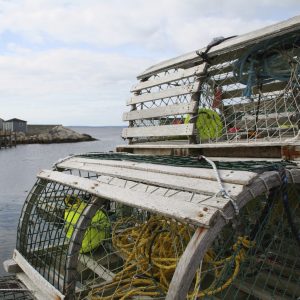EPSCoR, SSI to Fund New Research Opportunities Focused on Stakeholder Engagement
 Maine EPSCoR at the University of Maine through the Sustainability Solutions Initiative (SSI) will fund three projects as part of the Emerging Opportunities – Foundations for Future Research grant program. The program is focused on broadening the scope of SSI and the three opportunities offer researchers a chance to engage new stakeholders in new places in new ways.
Maine EPSCoR at the University of Maine through the Sustainability Solutions Initiative (SSI) will fund three projects as part of the Emerging Opportunities – Foundations for Future Research grant program. The program is focused on broadening the scope of SSI and the three opportunities offer researchers a chance to engage new stakeholders in new places in new ways.
From grappling with threatened fish species stuck in lobster traps, to examining questionable private forest sustainability standards, to providing tourists with a virtual reality wind power experience, the projects offer breadth and diversity. Most importantly, they live up to SSI’s primary mission: to be a leader and valued partner in understanding and solving societal problems related to the growing challenge of improving human well-being while protecting the planet’s life support systems. The research portion of each project must be concluded in 2014.
Building Alliances with Lobstermen in the Gulf of Maine
This team plans to form alliances with lobstermen working the Gulf of Maine to address the problem of bycatch in fisheries management. Bycatch, the incidental catch of non-target species in traps or nets, is a high-stakes issue for scientific and fishing communities, one that could shrink lobstering grounds for Mainers who have been fishing the gulf for generations.
The team – led by Yong Chen, Professor of Fisheries Science, and Christine Beitl, Assistant Professor of Anthropology – will work closely with lobstermen to determine the ecological, social and economic impact of bycatch in the region.
Sustainable Forestry: An Evaluation
This team will look at certification of private forest tracts in Maine – a designation meant to signify that landowners are engaged in successful sustainable stewardship. This project will examine whether certification actually promotes long-term sustainability.
Led by Robert S. Seymour, Curtis Hutchins Professor of Forest Resources, researchers will work with varied stakeholders to study the meaningfulness of certification systems. These “green certifications” are sanctioned in Maine by private systems such as the Forest Stewardship Council, the Master Logger Certification and others. Said systems are looking for balance in private foresting: a sustained wood supply and steady source of jobs paired with a commitment to support diverse wildlife and maintain recreation areas such as trails or park
The stakeholder engagement process will begin with detailed interviews. Among those sought out: non-governmental environmental organizations such as certification systems, foresters, policy-makers, landowners, buyers of certified raw forest products and employees of the U.S. Forest Certification Council.
Experiencing the Impacts of Wind Energy… Virtually
Striving to combine the best of high-tech and high-touch, this team is developing a virtual reality interaction tool (VRI) that will offer a realistic simulation of the controversial offshore wind farm expected off Monhegan Island.
Nicholas A. Giudice, Associate Professor of Spatial Information Science and Engineering will lead the team in the complex project with the goal of creating a sight-sound experience that will help tourists envision the reality of the two-turbine system proposed for 2016 – and whether they would remain interested in visiting the island post-wind farm.
Researchers want to offer a close facsimile of real life, one that allows stakeholders to see the spinning blades and experience the flicker effect than can be often present, one that gives them a chance to hear what the turbines will sound like at different wind speeds. With the VRI in place this summer, researchers will begin data collection, using intercept survey techniques during the ferry ride to the island. Tourist participants will be surveyed during their ride out followed by interaction with the VRI tool. The same tourists will be surveyed again on their way back to shore.
The team will share results with the Monhegan Island Wind Working Group, which represents tourist-based business owners, assessors, power district representatives, commercial fisherman and residents. Researchers will work with the group to write a final report for Monhegan residents.
